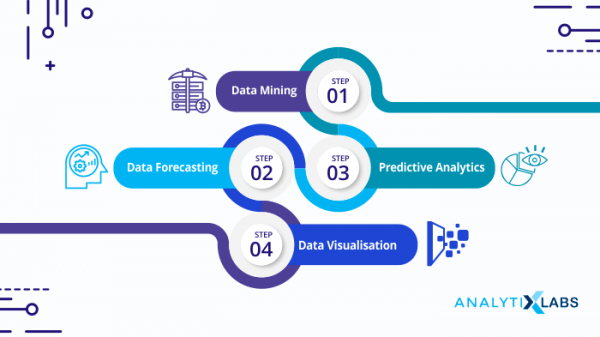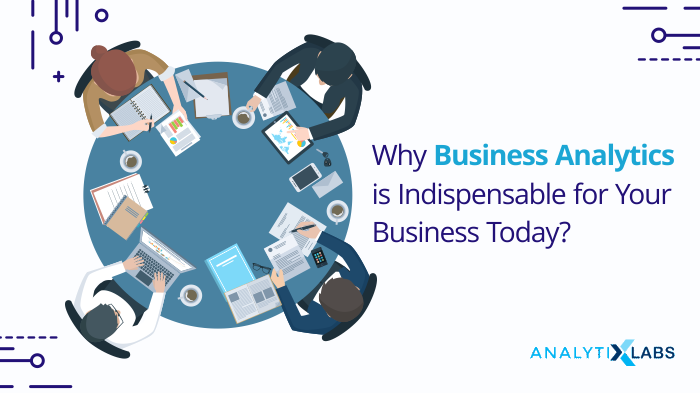Business Analytics has now become a very essential element of any business, so much that the majority of controlled decision-making is derived from its outputs. In layman’s terms, gathering the past data and statistics of a business, crunching it accordingly to make meaningful insights and patterns of customer behaviour and purchasing analysis, to make future business decisions for any company, is called Business Analytics.

If we track everything back to the beginning of the classic barter system, goods and services were exchanged to purchase certain products or to avail any service. This always had been the avenue to spark business deals between two parties. A few still existent popular examples may be exchange of cigarettes at prisons (Shhhh… Secret!), or exchange of food in return to an hour’s work of cleaning.
Centuries ago, when humans relied on rocks and stones to practically do everything, numericals were marked or carved on wood and rock to keep a track of what is happening with the business. But as times changed with the evolution of technology and internet, new paths have been carved into making business analytics being the center stage of any business.
Big Data
Along with the immense development in technology and internet, one thing that led itself to an aggressive explosion is data. As a business moves forward, large chunks of data is collected on a daily basis, based on the buying patterns of customers, search histories, location, navigation, digital footprint etc. This vast amount of data derived from the past history statistics is now given a name ‘Big Data’, which is often said to be even more valuable than oil. (“Data is the new oil!”).
Businesses and corporations might find it expensive to access and implement various Big Data tools. But as and when they are in place, they could eventually observe that there is a large reduction in costs of Information Technology (IT) and its corresponding staff. Further, there cannot be a scope of incorrect data creeping in with these tools. The appropriate Machine Learning (ML) algorithms ensure that the data gathered is free of errors and this data is subsequently stored in warehouses.
Times have changed so much that Big Data is now more necessary than important, owing to the increasing competition in the market. The scenario has become such that the business that uses Big Data and business analytics efficiently, has a significant edge over all of its competitors.
So isn’t it time yet to make this transformational shift for your business?
If you are still not convinced, go ahead and read the rest…
Advantages of Big Data for Business Analytics

-
Quicker Decision-Making
A business will not have to wait for some report to arrive to assess and analyse for the next business decision. With Big Data present under one roof, the Machine Learning algorithms optimise the existing data and automates the predictive patterns quickly. This effectively decreases the time consumed to make a certain business decision or implementation of the next strategy.
-
Reduction of Unnecessary Costs
A data-driven approach if implemented in marketing strategies, supply chain management or even logistics (in case of e-commerce), reduces the expenditure drastically. When there is enough necessary data that defines and predicts how the consumer is going to act at a certain point, the business can take necessary action to not funnel that money into any risky avenues.
-
Better Customer Service
If a business knows the buying behaviour of a consumer and what his or her next step might be, it is extremely convenient to service the consumer with the best available options.
-
Competitive Edge
Efficient usage of big data and producing necessary predictive models makes it simpler for a business to understand what the consumer likes and what he or she doesn’t. This will help the business offer better offers and services with their products as compared to its competitors.
-
Fresh Product Ideas and Innovation
With the volume of data being so large, opportunities for a business turns out to be manyfold. Business Analytics with the help of Big Data might help the business move a step ahead and come up with a new and innovative product that would, in turn, help boost sales and revenue.
-
Digital Footprint and Brand Positioning
The online presence of a company says a lot about how well the brand is positioned and how attractive it is for its digital audience. Using Big Data tools and Business Analytics can help the business better understand what the audience has to say about their products and services. Something as narrow as comments from Facebook, Twitter and Instagram derive plenty of value for the business.
You can also enroll in our Business Analytics Course and learn all the fundamentals and advanced aspects at your convenience, or you can book a demo with us.
The Processes of Business Analytics

Big Data is undoubtedly a highly critical component of running a business in this age.
Here is how this data is crunched in different processes to deliver the best possible predictive outputs for a business.
-
Data Mining
Data mining is all about considering the past data patterns, trends and analysing them. This helps the business discover the hidden patterns through which meaningful results can be obtained. This data, once collected, is transferred into a data warehouse, which in turn is shared with databases of multiple dimensions.
Data analysts of a company examine these data patterns and they are presented in easily-understandable graphs or charts. As for social media patterns, this mined data helps a business understand the behaviour of a customer and see where his or her interests lie. This leads to better servicing to consumers.
-
Data Forecasting
Data forecasting refers to making a deep analysis of the past data and making an estimation of how the future might be for a business. This forecasted data is presented in estimations that help businesses make better-informed decisions, like allocating a budget or plan expenditure. Machine Learning (ML) is a crucial tool used here to help optimise the data to the best extent possible and produce predictive patterns. For more details, please read Business Forecasting: Meaning, Methods & More
-
Predictive Analytics
Predictive analytics is an extension of data forecasting, where predictive models are released that inform a business to make the best possible decision based on the potential risks and alternatives. Predictive analytics is an integral part of any website-based business like e-commerce, streaming platforms, where suggestions and advertisements are released to the customers based on their previous searches and history of purchases.
-
Data Visualisation
The data that is predicted to be useful for the business is represented in an easy, user-friendly and a convenient way for the analysts and business owners, in the forms of pie-charts, diagrams, graphs, tables etc. This process is called data visualisation.
Scope and Future for Business Analytics
The future for Business Analytics is self-explanatory, since it is all about predicting how the future of a business can be, based on Big Data. Simply put, the scope of Business Analytics is directly proportional to data, and it keeps evolving as the data keeps growing.
Eric Schmidt, the ex-chairman of Google, once said that, in the current times, the data that is produced every two days is equal to all the amount of data that was produced till 2003, starting from the dawn of the civilisation. That’s a lot of data!
Evidently, it seems like there is no stopping the explosion of Big Data. With automation and Artificial Intelligence currently dominating the business world, it is however, going to be more hassle-free for businesses to make the best use of this data. Essentially, the companies that use Business Analytics to the maximum possible extent are going to stand out and be the most innovative.
Tracking human behaviour has become the new superpower, that pushes the world’s business forward and it is now one of the best drivers of the global economy.
Machines waking you up, giving you navigational directions, voice commands fetching you information and doing things for you, things like these were only a dream a decade ago, and what was thought of as a fancy future. This revolutionary juncture between human behaviour and Big Data is certainly pushing the technology and innovation forward, and it shows no signs of halting whatsoever.
So up your business game to the next level by employing Business Analytics!









2 Comments
Thanks for the Impressive content. Keep up the good work.
That is an extraordinary and inventive data that I have perused. A debt of gratitude is in order for sharing